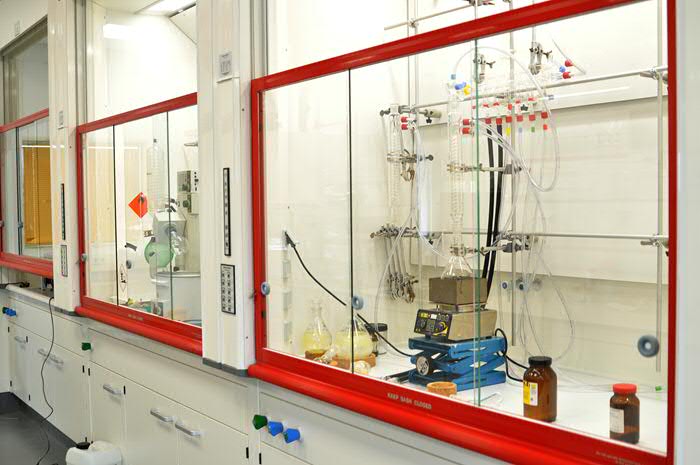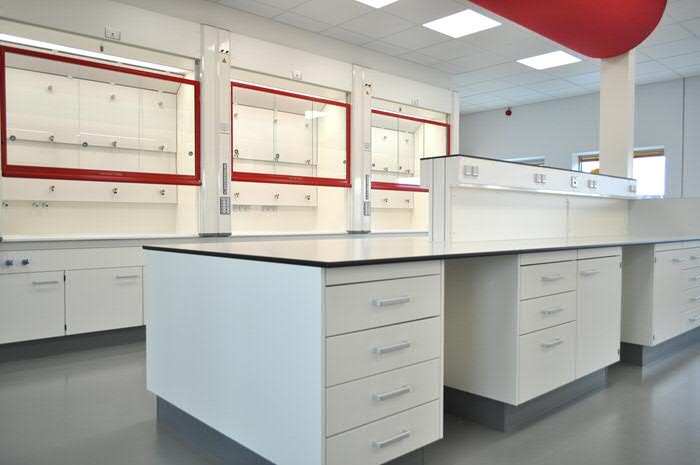New facility for start-ups in the chemical sector will boost innovation on Zernike Campus

Innolab Chemie, a new testing ground for start-up businesses in the chemical sector, will open on the Zernike Campus Groningen on Saturday 26 September 2015. Patrick Brouns, member of the Provincial Executive, Ben Feringa, Professor of Organic Chemistry at the University of Groningen, and Gerard van Harten, the figurehead of the Top Sector Chemistry, will perform the opening ceremony. Innolab Chemie provides start - up businesses in the chemical sector with general lab facilities such as fume cupboards, lab workbenches and office space.
The facilities at Innolab Chemie are suitable for research in the fields of chemistry, microbiology and biochemistry. Three companies have already signed a rental contract, highlighting the fact that these facilities are exactly what the industry needs. Innolab Chemie is the first testing ground for start-ups in the chemical sector in the Northern Netherlands; the possibility of short-term rentals (starting from 3 months) makes it unique.
New in the Northern Netherlands
Innolab Chemie is a new concept in the Northern Netherlands. It gives companies starting up in the chemical and life sciences sectors an opportunity to get their companies off the ground at favourable rates. It has two self-contained units, each with six fume cupboards for rent, and independent office space if required. Another 12 fume cupboards are also available for rent in an open area. Most of Innolab Chemie’s target group (chemistry graduates) have neither the financial means to invest in expensive lab facilities like these, nor a good network of financial backers, customers and researchers. By providing practical facilities and help with business development, Innolab Chemie is offering these start-up companies a stepping stone from inception and research to marketable product.
Innolab Chemie mission
Innolab Chemie aims to stimulate, facilitate and support activity and initiatives in the chemical sector on the path from the University of Groningen to entrepreneurship. This makes Innolab Chemie Groningen the perfect place for initiatives and product development in biobased economy, energy, life sciences, healthy ageing, sustainability and agro-food. In addition to providing a physical location with basic facilities, Innolab Chemie also supports various other aspects of business development, including strategy, intellectual property issues, legal aspects, the administrative side, finance and risk analyses. The founding fathers of Innolab Chemie are the RUG Houdstermaatschappij BV, Stichting Triade (UMCG) supported by Business Generator Groningen, Syncom BV and Research & Valorisation (department of the University of Groningen).
Programme for the opening
The opening will take place on Saturday 26 September at 4 p.m. Guests are welcome from 3.30 p.m. onwards. After the opening ceremony, performed by Patrick Brouns of the Provincial Executive, Professor Ben Feringa and Gerard van Harten, guests will be given a guided tour of the Innolab Chemie facilities by Innolab Chemie’s first three tenants: Biofuran, Carmolex and Telesis. This will be followed by drinks for the guests. The programme finishes at 5.30 p.m. The opening ceremony will be held at De Mudden 14 on the Zernike Campus Groningen.


| Last modified: | 24 September 2021 3.54 p.m. |
More news
-
15 April 2025
1.5 million funding from Province of Groningen for innovative technology in the region
The University of Groningen will receive nearly 1.5 million euros in funding from the Province of Groningen to assist entrepreneurial academic researchers in developing innovative ideas into a startup.
-
15 April 2025
Nathalie Katsonis wins Ammodo Science Award 2025
For her pioneering research on molecular systems, Nathalie Katsonis receives the Ammodo Science Award for fundamental research 2025.
-
15 April 2025
Fundamental research with life-size effects
Nathalie Katsonis has won the Ammodo Science Award for Fundamental Research. She develops adaptive molecular materials and studies the chemical origins of life, which in turn yield insights for vaccines and clearing up oil spills at sea.
